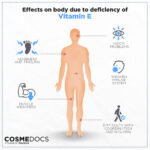Vitamin deficiency prevention is a cornerstone of public health and individual well-being. Adequate vitamin intake ensures proper metabolic functioning, supports immune defense, promotes healthy growth, and prevents chronic diseases. We must adopt preventive measures that are sustainable, evidence-based, and tailored to individual nutritional needs.

Understanding the Role of Vitamins in Health
Vitamins are essential micronutrients required in small amounts for normal growth, development, and physiological processes. They support critical functions such as:
- Immune regulation (e.g., Vitamin C, D)
- Bone health (e.g., Vitamin D, K)
- Energy metabolism (e.g., B-complex vitamins)
- Vision and skin health (e.g., Vitamin A)
- Cognitive function and nervous system support (e.g., B12, folate)
A lack of vitamins, if prolonged, leads to deficiency syndromes with potentially severe clinical manifestations.
Major Causes of Vitamin Deficiencies
1. Poor Dietary Patterns
Monotonous diets lacking diversity often lead to multiple micronutrient deficiencies.
2. Limited Sunlight Exposure
Inadequate UVB exposure can hinder vitamin D synthesis in the skin.
3. Malabsorption Disorders
Conditions like celiac disease, Crohn’s disease, and pancreatic insufficiency interfere with nutrient absorption.
4. Medication Interactions
Prolonged use of diuretics, antiepileptics, and antacids may deplete specific vitamin levels.
5. Alcoholism and Substance Abuse
Excessive alcohol impairs nutrient absorption and increases urinary excretion of water-soluble vitamins.
Key Strategies for Vitamin Deficiency Prevention
Balanced Diet: The Foundation of Prevention
Consuming a diverse and nutrient-dense diet is the most effective way to prevent deficiencies.
| Food Group | Key Vitamins Provided |
|---|---|
| Leafy Greens | Vitamins A, C, K, folate |
| Citrus Fruits | Vitamin C |
| Whole Grains | B-complex vitamins |
| Dairy Products | Vitamin D, B12, riboflavin |
| Eggs and Meats | Vitamin A, B12, niacin |
| Nuts and Seeds | Vitamin E, B1, B6 |
| Oily Fish | Vitamin D, B3 |
Food Fortification Programs
Countries often implement fortification of staples like milk, flour, and cereals with vitamins such as A, D, B12, and folic acid to reduce widespread deficiency risk.
Supplementation for At-Risk Populations
Targeted vitamin supplements are essential in the following groups:
- Pregnant and lactating women (folic acid, iron, vitamin D)
- Elderly individuals (vitamin D, B12)
- Infants (vitamin K at birth, vitamin D drops)
- Vegans (vitamin B12)
- Patients with chronic illnesses or gastrointestinal disorders
Lifestyle Modifications
- Sun Exposure: 15–30 minutes of direct sun exposure, 2–3 times per week, boosts vitamin D synthesis.
- Avoid Smoking and Excessive Alcohol: These habits deplete vital nutrients and hinder absorption.
- Hydration and Gut Health: Adequate fluid intake and fiber-rich foods improve vitamin absorption.
Role of Health Education in Prevention
Educating communities about the importance of vitamin intake and sources of nutrients is essential. Health workers, schools, and media campaigns must promote:
- Nutritional literacy
- Proper cooking techniques to preserve vitamin content
- Awareness of early deficiency symptoms
Monitoring and Screening for Early Detection
Routine vitamin screening in high-risk individuals can detect subclinical deficiencies before complications arise. This includes:
- Serum 25(OH)D for Vitamin D
- Serum B12 and methylmalonic acid for B12
- Serum folate
- Prothrombin time for Vitamin K
Special Considerations for Different Age Groups
Infants and Children
- Exclusive breastfeeding may require vitamin D supplementation.
- Weaning diets must include vitamin-rich solids.
Adolescents
- Increased nutritional needs during growth spurts should be met with diversified meals.
Adults and Elderly
- Bone health and cognitive function decline with age, requiring sufficient vitamin D, B12, and folate.
Global Public Health Measures
International bodies like WHO and UNICEF promote large-scale interventions such as:
- Vitamin A supplementation programs in underdeveloped regions
- Iron-folate supplementation for pregnant women
- School-based nutrition initiatives
- Universal fortification of staple foods
These programs have demonstrated measurable reductions in vitamin-related diseases such as rickets, scurvy, and neural tube defects.
Consequences of Ignoring Prevention
Failing to implement proper preventive strategies can lead to:
- Increased susceptibility to infections
- Developmental delays in children
- Chronic fatigue and cognitive impairment
- Higher healthcare costs due to deficiency-related complications
Vitamin deficiency prevention is a multi-faceted approach involving nutritional balance, education, supplementation, and public health policy. By promoting awareness and access to nutrient-rich food sources and fortified products, we can prevent the far-reaching effects of vitamin deficiencies and ensure healthier lives across all populations.

